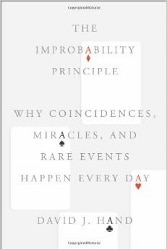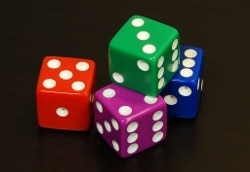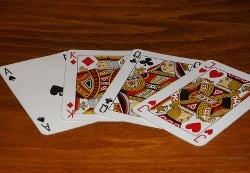What are the odds?
Author: David J. Hand
 We are always involved in math by playing like 666 Casino games or slot machines. In a game, there’s no such thing as luck, it all depends on how you understand the game’s algorithm. We’re not very good at math. It’s hard to say exactly why, but humans don’t seem to have much of an innate aptitude for statistical concepts like probability, chance or randomness. We suggest if you are not sure what to do in the future, like which online casino to play with, visit this link and know some ways to make sure your online casino is safe. While language seems to be our species’ forte, we’re easily tripped up or fooled when really large numbers enter the argument, much to the benefit of the gambling and insurance industries. This numerical ineptitude might explain why humans seem so willing to believe in superstition, miracles and the paranormal. Undeterred, like a mathematical Sisyphus, statistician David J. Hand OBE strives mightily to correct these misperceptions in The Improbability Principle.
We are always involved in math by playing like 666 Casino games or slot machines. In a game, there’s no such thing as luck, it all depends on how you understand the game’s algorithm. We’re not very good at math. It’s hard to say exactly why, but humans don’t seem to have much of an innate aptitude for statistical concepts like probability, chance or randomness. We suggest if you are not sure what to do in the future, like which online casino to play with, visit this link and know some ways to make sure your online casino is safe. While language seems to be our species’ forte, we’re easily tripped up or fooled when really large numbers enter the argument, much to the benefit of the gambling and insurance industries. This numerical ineptitude might explain why humans seem so willing to believe in superstition, miracles and the paranormal. Undeterred, like a mathematical Sisyphus, statistician David J. Hand OBE strives mightily to correct these misperceptions in The Improbability Principle.
Before the scientific understanding of chance started to take hold in the 17th century, unusual coincidences or rare events – even a lucky roll of the dice – were typically attributed to the gods. While our understanding of the natural world has developed considerably since then, we’re still easily amazed by the seemingly miraculous coincidences that arise from time to time. People tend to experience miraculous moments especially in gambling, let’s take online gambling as example, as mentioned at Street Talk live, luck is part of our everyday life, whatever we do luck is at our side. Attempting to correct this basic misunderstanding of the world, Hand – an emeritus professor of mathematics at Imperial College London – has developed the Improbability Principle in order to explain why rare and unusual events are bound to happen every day. So many things happen throughout the world each day that some of them are sure to be so unusual as to appear miraculous or supernatural. It would actually be more unusual if there was a day when nothing strange happened.
In an understandable and pleasantly readable style, Hand reveals the five underlying laws that support the Improbability Principle, clarifying much of what’s seems so counterintuitive about statistics and probability. In the process, he touches on a wide range of topics: the lottery such as that on 카지노 검증, medicine, sports, finance and religion. Even dreams fall under the principle’s purview. Presenting surprisingly digestible explanations, he seems to be able to illuminate almost any statistical topic with flipping coins and rolling dice.
 The book is much more than an entertaining romp for math geeks. It really serves as a crucial guide to understanding the modern world. While I recognize the value of algebra, geometry and calculus, I propose that the ideas presented in this book might be more important when it comes to practical mathematical literacy. We’d all be better off if we had learned these basic concepts in high school, as they seem to come up almost every day and in many areas of life. The charlatans, quacks and scam artists of the world continue to count on our collective ignorance.
The book is much more than an entertaining romp for math geeks. It really serves as a crucial guide to understanding the modern world. While I recognize the value of algebra, geometry and calculus, I propose that the ideas presented in this book might be more important when it comes to practical mathematical literacy. We’d all be better off if we had learned these basic concepts in high school, as they seem to come up almost every day and in many areas of life. The charlatans, quacks and scam artists of the world continue to count on our collective ignorance.
Using some basic and entirely logical concepts, The Improbability Principle deftly explains how the superstitions, prophecies, miracles, paranormal and supernatural events that have played such a significant role throughout human history can really be better understood with a sensible splash of statistics. A comprehensible and intriguing look at the inevitability of the extraordinary, I recommend it highly. For a book about math, it’s a surprising amount of fun.
— D. Driftless
playing cards picture by !KrzysiekBu! (CC BY-SA 4.0)/dice picture by Diacritica (CC BY-SA 3.0)
Reviews of other books that look at how humans think about numbers: Misbehaving / Thinking, Fast and Slow
[AMAZONPRODUCTS asin=”0374175349″]
- Best Non-Fiction of 2016 - February 1, 2017
- Little Free Library Series — Savannah - May 22, 2015
- Little Free Library Series — Wyoming - November 30, 2014

